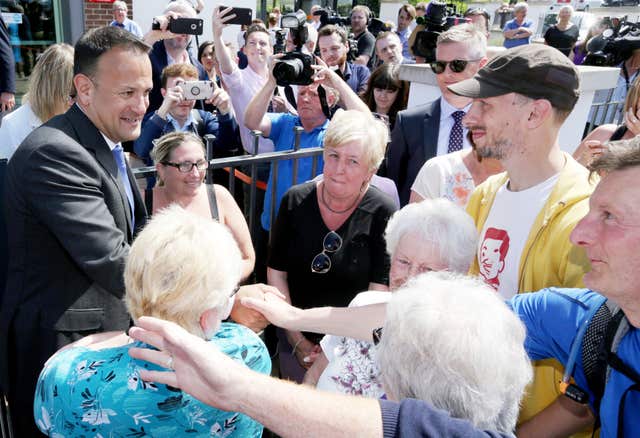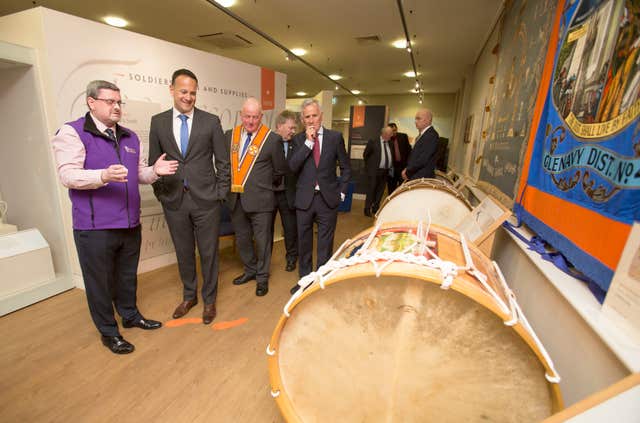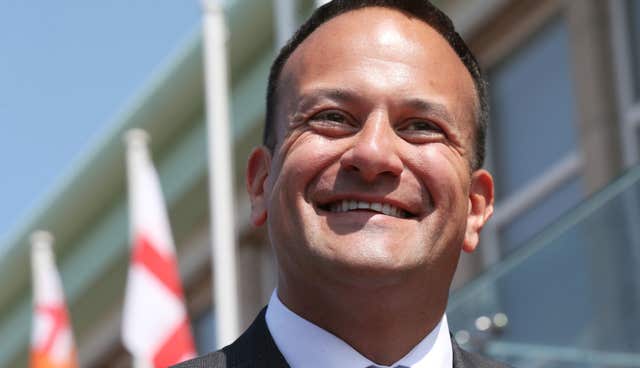
Taoiseach Leo Varadkar said he wanted to be viewed in Northern Ireland as a neighbour not an invader, as he made symbolic visits in Belfast that spanned both orange and green traditions.
Mr Varadkar became the first Irish premier to visit the Orange Order’s headquarters as he toured Schomberg House in a staunchly unionist part of east Belfast on Friday morning.
Hours later he was travelling to the nationalist west of the city to launch the 30th outing of the renowned Feile an Phobail community festival.
After receiving a warm welcome at the Grand Orange Lodge of Ireland – locals applauding him on arrival and departure – the Taoiseach said he hoped to forge better relations with the institution, and move on from past tensions between it and the Irish state.
“I believe that Protestant heritage, Protestant history, Orange heritage, is part of our shared history,” he said.
“It’s not just something that is about Northern Ireland – it’s something that applies in all parts of Ireland and very often we can be too binary.
“Things are never as simple as north versus south or orange versus green – our history is very complex.”

After his visit, Mr Varadkar was asked about fraying relations with unionist politicians over Brexit, a cooling that has seen him accused of aggressive tactics and bad manners by the Democratic Unionists.
“My mother brought me up to have very good manners so I hope people don’t think I am ill-mannerly at all,” he replied.
“When I come north I see myself as a neighbour not as an invader, as the head of government of another jurisdiction.
“And I see this place, Northern Ireland, as a neighbouring jurisdiction but also one in which there are almost a million people who are Irish citizens and we need to acknowledge that, the fact that it does make it a unique place.
“What I am trying to do on this trip is to reach out to all communities in Northern Ireland to understand their needs and perspectives better and try to cement relationships that I think we can build on in the future.”

The Taoiseach said notwithstanding remarks from some politicians, he always received a very warm welcome from ordinary people in Northern Ireland.
Moments later he was surrounded by a group of local women who had been waiting at the gates of Schomberg House, keen to shake his hand.
If the departure in east Belfast was warm, there was an edge to his arrival in west Belfast, as a group of anti-abortion protesters gathered at the gates of St Mary’s College ahead of the festival launch.
The demonstrators voiced anger about the Taoiseach’s support of reform of abortion law in the Irish Republic. They held up graphic placards and shouted “repent” as Mr Varadkar’s car swept through the gates.
‘I want to commend those who founded this festival thirty years ago’ Leo Varadkar speaking about Féile at the 30th anniversary launch event today pic.twitter.com/JiGLvvwvBz
— Féile an Phobail (@FeileBelfast) June 8, 2018
In his subsequent speech to launch the Feile, Mr Varadkar reassured nationalists that the Irish government recognised their “deep concern” about Brexit and the potential impact for north-south relations.
“The European Union brought Britain and Ireland closer together and eliminated many of the differences and that in turn made peace possible,” he said.
On Brexit, he added: “It’s also brought the issue of the border into focus and I want to assure you that the Irish government shares your concerns.
“So from the beginning we have made it our policy to protect the Good Friday Agreement and to make that central to our approach to Brexit.”
Mr Varadkar said he had no doubt Brexit was a “major factor” in the ongoing political impasse in Northern Ireland.
In an reference to the rights issues currently dividing the DUP and Sinn Fein – namely same sex marriage, the Irish language and abortion – the Taoiseach said he believed any right enjoyed by citizens in Great Britain and the Irish Republic should be enjoyed by people in Northern Ireland.
During his trip north he was also asked about a suggestion by former Democratic Unionist leader Peter Robinson to hold fixed generational polls on Irish unification as a way to stabilise politics in Northern Ireland.
Ex-Stormont first minister Mr Robinson said the approach would help make the constitutional question less disruptive to local politics and the prospect of a referendum less threatening.

Mr Varadkar insisted it was not the time for a border referendum, claiming it would further polarise communities. He said it also be unlikely to result in a vote to reunify the island.
“It would cause people to break down once again on traditional lines,” he said.
“One valid point that Peter did make was if there ever was a referendum on the border it’s not something that should happen every three years or five years or seven years.
“The point he was making was decisions like that should be once in a generation. I think that was a sensible point.”
Earlier, during his tour of the Orange museum, Mr Varadkar met the leadership of the Order, including senior Orangemen from the Republic of Ireland. Two Orangemen from Co Donegal spoke with him in Irish.
He posed beside a sign commemorating the 1690 Battle of the Boyne and also paid respects at a memorial window dedicated to the 336 members of the organisation who were murdered during the Troubles.
I’d encourage anyone to visit @OrangeHeritage to learn more about the Protestant heritage. I’ll be back for sure pic.twitter.com/POnjLlbP8L
— Leo Varadkar (@campaignforleo) June 8, 2018
Grand Master of the Grand Orange Lodge of Ireland Edward Stevenson said: “We acknowledge this is a significant moment, as it is the first time a serving leader of the Republic of Ireland government has visited the headquarters of the Grand Orange Lodge of Ireland.
“As a cross-border organisation, we welcome the Taoiseach’s direct engagement with our members based in the border counties of the Republic and, in so doing, recognising the longstanding cultural identity of the Orange family in the south.
“It is also important to acknowledge the importance of the Taoiseach paying his respects to those members of our institution, many of whom served in the security forces, who were murdered by terrorists.
“Such a gesture should not be underestimated and will, I believe, be deeply appreciated by many relatives of the deceased, and the Orange membership as a whole.”
Next stop in Northern Ireland is meeting business and civic society leaders at @QUBelfast to get their views about current issues like #Brexit pic.twitter.com/3p5tkT2QfA
— Leo Varadkar (@campaignforleo) June 8, 2018
The Taoiseach kicked off a day of engagements in Belfast with a private meeting with Baroness Paisley, the widow of former DUP leader Ian Paisley, at a library dedicated to his memory in the east of the city.
He also had a private lunch with business leaders and academics at Queen’s University in Belfast.
The Taoiseach rounded off his trip to Belfast by stopping for a pint of beer in Maverick gay bar in the city centre.
Barman James Magennis said: “It was great to see him and it’s great to have a Taoiseach representing the LGBT community”.


Comments: Our rules
We want our comments to be a lively and valuable part of our community - a place where readers can debate and engage with the most important local issues. The ability to comment on our stories is a privilege, not a right, however, and that privilege may be withdrawn if it is abused or misused.
Please report any comments that break our rules.
Read the rules here